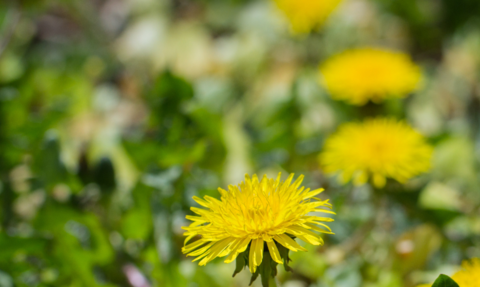
Identiplant
Hertfordshire and Middlesex Wildlife Trust is delivering Identiplant in partnership with the Botanical Society of Britain and Ireland (BSBI). Find out more about the 2025 Identiplant course below.
Identiplant has been created to take near beginners to an intermediate level, for those who want to get started with serious botany.
The Course
Identiplant is intended for beginners who have some knowledge of plants and are ready to advance from identification by matching pictures and remembering names to a systematic approach, using scientific names, written descriptions and keys. This results in the confidence and accuracy that is essential in identification and leads to further progress, either independently or through field meetings and courses or recording groups.
By the end of the course you will have:
- become familiar with botanical terminology
- learnt the key diagnostic features of our commonest plant families
- become confident in using floras and botanical keys
- improved your observational skills
- developed the critical faculty necessary for accurate identification
If you are thinking about taking the Identiplant course, please ensure you have read all the information below before registering.
Course Structure And Organisation
There are 15 units, all except unit 15 followed by a question sheet which you answer and email to your tutor. See sample units and question sheet.
- Classification and Names
- Terminology
- Keys
- The Cabbage Family – Brassicaceae
- The Buttercup Family – Ranunculaceae
- The Lily Family – Liliaceae
- The Campion Family – Caryophyllaceae
- The Carrot Family – Apiaceae
- The Pea Family – Fabaceae
- The Rose Family – Rosaceae
- The Deadnettle Family – Lamiaceae
- The Figwort Family – Scrophulariaceae
- Some Small Families and how to prepare voucher specimens
- The Daisy Family – Asteraceae
- The Orchid Family – Orchidaceae
The first three units provide a foundation of basic theory then the most important families are covered, not in taxonomic sequence but in the order of their peak flowering times. The questions (with the exception of a few mainly in units 1-3) require you to find and examine wild plants. The species asked for are all quite common throughout Britain and Ireland, many of them grow in urban settings, around gardens or on roadsides and there is always some choice. Identiplant might not introduce you to any new species but you will study them in a new way.
The course units will be emailed to you by your tutor in groups, probably units 1-3, 4-7, 8-11 and 12-15, the actual dates varying according to your geographical location. There is no time limit on the return of answer sheets apart from the general deadline of 30th September but each question sheet carries a 'not before' date, these being at fortnightly intervals. The object is to discourage students from rushing to submit, with answers taken from the book and before they have seen fruits.
This is essentially a practical course and there are two to three named species to find for every unit. This means that you will have a ‘wanted list’ throughout the summer. Finding named species, even very common ones, is a challenge and can be frustrating but is also an enjoyable hunt that sharpens your observation. The task is then to pick out the diagnostic features that lead to the plant’s family and thence to the individual species. This is the basis of fast but accurate field identification and the use of keys.
Students who complete all answer sheets are awarded a Certificate of Completion. The course is not accredited but is accepted as continuing professional development (CPD). The most important outcomes will be recognition by other botanists and the knowledge and confidence to progress, either independently or with a group, to higher levels.
Your Tutor
You will have a personal tutor who is an experienced botanist familiar with your own geographical area. Your tutor corrects your answers and gives advice for improvement but numerical marks or grades are not given, the unit is simply recorded as ‘Complete’ or ‘Incomplete’. You learn from your tutor’s comments and you never have to repeat a question unless you made a serious mistake – for example that your tutor thinks that you found the wrong species. Communication with your tutor is by email and they will answer questions relating to the course and might give advice about where to look for a plant species if you are having difficulty.
The Organisation
Hertfordshire and Middlesex Wildlife Trust is delivering Identiplant in partnership with the Botanical Society of Britain and Ireland (BSBI). The Botanical Society of Britain and Ireland (BSBI) administrates Identiplant and provides quality assurance for the course through its Skills and Training Committee, assisted by the Identiplant Management Team (IMT).
Our tutors are all dedicated to the training of new botanists and are happy to share their enthusiasm and expertise with their individual students. The IMT is composed of experienced Identiplant Tutors.
View the Identiplant poster from the 2022 British and Irish Botanical Conference, held in November 2022 at the Natural History Museum, London.
The course was originally written and directed by Brenda Harold, who has a PhD in plant cytogenetics, is a Chartered Biologist and a retired university lecturer. She is a long standing BSBI Referee and has tutored numerous adult courses for the Field Studies Council, Workers Educational Association, Wildlife Trust, Open University and other organisations. She has also volunteered as a Wildlife Site Surveyor for Herts & Middlesex Wildlife Trust and it was their need to train beginners that inspired this course.
Workload
Depending on your level of experience, about 3 hours per week should be sufficient to study the units and write up the answers – more for the important unit on terminology. The most time-consuming part of the course is finding the plants. There are no submission deadlines on the individual question sheets and they do not have to be returned in numerical sequence, so short interruptions due to holidays, workload etc. are not a problem. However, it is essential to continue fairly steadily through the season or flowering times will be missed. This course cannot be completed in short ‘crash’ sessions. You need to be continually on the lookout for the named species which then have to be examined in detail and described using proper terminology. It is this steady practice that enables the learning outcomes to be achieved.
The closing date for the submission of answer sheets is September 30th. A Certificate of Completion is awarded to everyone who has submitted all answer sheets, complete although with maybe a few unavoidable gaps.
You should contact your tutor promptly if you are having difficulty in completing unit assignments on time because they may be able to help. This is a one-year course and extensions into a second year will only be allowed in exceptional circumstances.
If you enjoy plant hunting and can find time for it then this is the course for you. Some former students have said that it becomes obsessive!
Fees and Equipment
The course fee in 2025 is £310.
Applicants employed professionally in complimentary fields are likely to have the course accepted as continuing professional development (CPD) by their employers. Non-professionals may be able to obtain a grant or bursary, especially if they are volunteers with an organisation that records or conserves wild plants. The BSBI and the Wild Flower Society both award grants annually; check availability and eligibility.
You will need a copy of The Wild Flower Key, Francis Rose, revised and updated by Clare O’Reilly, 2006 (available here from Summerfield Books, who offer a discount for BSBI Members). This guide is essential because we follow keys in it which are similar in structure to those in the New Flora of the British Isles, fourth edition, by Clive Stace. Where taxonomic revisions or name changes have occurred subsequent to 2006 these are all noted in the course units. Although there has not been a recent revision to this text, it is still an ideal learning tool for the course (as agreed by a committee of educationalists, county recorders and taxonomists). Other more up to date field guides are available for use in the field, but are not required for this course.
A x10 hand-lens is also essential (Summerfield also stock these) – an ordinary magnifying glass is not powerful enough. It is not necessary to purchase a more expensive lens at this stage and don’t buy one with a magnification greater than x10; these have an extremely small field of view and narrow depth of focus.
Registrations
The application form for 2025 will be available on the BSBI Identiplant website from 1st December 2024. Applications will close on 31st December 2024
The number of student places on the course is limited by the number of Tutors. While BSBI will look to meet demand where possible, where we have limited capacity, decisions will be made based on the personal statement provided in the application form about your motivation for doing the course and how you feel you would benefit from it. We are keen to ensure that highly motivated students with time to dedicate to completing the course are offered a place.
You will be informed by BSBI if you can be accepted and how to pay the course fee (please note that this may not be until after the Christmas/New Year break). Fees must be paid by 31 January and BSBI ask you to inform them immediately if you change your mind. No refunds can be given after the first course units have been issued.
Your tutor will contact you and send you the full student instructions and units 1 – 3 in early February (or as soon as your enrolment has been completed).
Course Completion
The closing date for the submission of answer sheets is September 30th 2025. A Certificate of Completion is awarded to everyone who has submitted all answer sheets, complete although with maybe a few unavoidable gaps.

